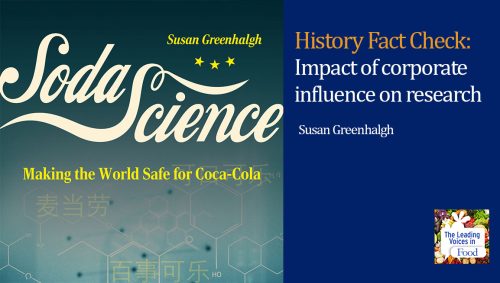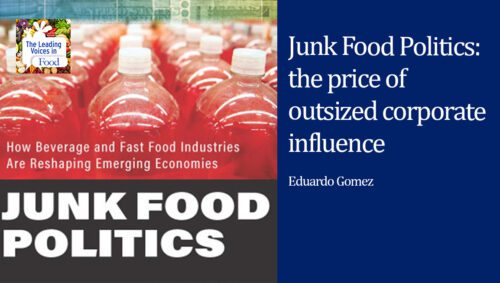E43: Barry Popkin on the International Success of Soda Taxes
Taxes on sugar sweetened beverages now exist in a number of cities in the United States, including Philadelphia, Oakland, and San Francisco, and in more than 40 countries around the world. These have been made possible by dedicated, passionate and talented people working on the science supporting the use of such taxes. They evaluated the impact of these taxes and have worked with governments to decide how taxes might be structured and implemented. And there is no person who does all these things better and does so in every corner of the world than Barry Popkin.
International Success of Soda Taxes
Subscribe: Apple Podcasts | TuneIN | YouTube Music | SoundCloud | PocketCasts | Radio Public
Tags: Childhood Obesity | Food Industry Behavior & Marketing | Obesity | Soda Taxes |

Barry Popkin is the W.R. Kenan Jr. Distinguished Professor in the Department of Nutrition at the University of North Carolina-Gillings School of Public Health. His training is an agricultural economics and he has done pioneering work on shifts in nutrition and physical activity in country after country around the world. And in fact coined the term ‘nutrition transition’ to discuss how Westernized dietary patterns have invaded countries around the world. And he’s documented the health and social impacts of these changes. Recently, he has been the individual most involved in working with cities and countries around the world on sugar sweetened beverage taxes.
Interview Summary
Barry, let me begin with asking you to do a quick survey of the soda tax picture around the world. Where do these taxes exist now?
Right now we have taxes in over 42 countries. Around 12 of those are small islands in the Caribbean or Western Pacific. We have them in the United Kingdom and France, South Africa, Mexico, Chile, and just a large number of other countries in both Europe, Asia and Latin America, Thailand, others, and a smaller ones in countries like India. So essentially we’ve really got sugary beverage taxes in every region of the world.
It’s impressive how these have spread around the world and really exist in lots of different places. So let’s talk about the structure of these taxes. This might seem like nuance but isn’t. Many people, Barry, would believe that these taxes would logically be a sales tax. But in fact it turns out to be pretty important how these are structured. And there’s a difference between sales and excise taxes. Can you explain how that works?
Well, the main issue for sales versus excise tax is in the US where with a sales tax you don’t see the price when you purchase it. You don’t see it on the item when you buy in the store. Whereas an excise tax is put on the manufacturer or the bottler distributor of the beverage so that you see it. In many countries they put the total tax–the total price including the tax on the item. So it depends on the country. But we want people to see the price so that they are cut their sugary beverage consumption because they know prices have gone up
Isn’t it true in the US the sales tax is typically a percentage tax, and that that would encourage people to buy large containers of things? How would that work?
That’s true for actually all of these taxes that we do in the US. Every one of them is not based on grams of sugar, but it’s based on a certain percentage of value. And so that if you base it on volume like liters it tends to be that the larger volume gets more sugar in it and costs less. So it’s a little bit complex, but the reality is the ideal way is to base it on the grams of sugar so you have an equal tax for every gram of sugar on the beverage.
So let’s talk about how well these taxes work. So you lead a very impressive group of researchers in evaluating the impact on the taxes on sugar beverage consumption. But also what happens to other beverages as people change consumption from the sugary ones. So what are the results showing so far? And why don’t we take Mexico for example, because you’ve done a good bit of work there, right?
Mexico was the first large country in the world to have an evaluation done on and the only country initially. And essentially what it showed was that as sugar beverage taxes came in, people shifted from sugar sweetened beverages to water. And that was enlightening. And, and that’s been the case in Latin America. We don’t know how that will work in other regions in the world until people come out with the kind of studies looking at the substitution. But in Mexico people shifted to water. So in fact it really reduced caloric intake.
So Barry, how much did consumption decrease and how big was the tax? And were you expecting the shift to be about what it was, given the size of the tax?
The tax in Mexico is approximately 10%. The consumption in the first year declined over the whole year by 6% and in the second year by an additional 4%. So we had, at the end of two years, a 10% reduction.
I remember back when you and our group and others were looking at doing some modeling to try to estimate how these taxes would work. Because at one point the taxes hadn’t existed yet. And as I remember, 10% increase in price was right about that cusp where you may not have figured that consumption would change. So it’s pretty impressive that consumption actually did change by 10%.
Right. But we would assume that that wouldn’t affect consumption as much in the US. But even in Berkeley it seemed to affect consumption some. But the higher tax in Philadelphia from preliminary studies show a much larger effect. And the countries like Saudi Arabia and others that are having a 50% tax. That’s what we think we want 20% or more. 50% will truly impact behaviors such as that implemented in Saudi Arabia.
So does it kind of work in a linear way that if you go from 10% to 20% increase in price, that the impact is twice as much? And if you go to 30 it’s even more? How does that work?
It works in a linear way. But, it actually increases the impact as you go up in price as we seem to find. So that going from 10 to 20 doesn’t just double reduction, but it has a bigger effect because people become that much more price sensitive. So whereas we thought it would be linear and equal in reductions, it seems to be a greater set of reductions as the price goes up.
Let’s go back to that issue that you mentioned earlier that people in Mexico, as they were decreasing their consumption of sugar sweetened beverages, were increasing their consumption of water. That’s pretty much the ideal outcome, isn’t it? Because what they could be going to equally caloric beverages that aren’t taxed or they could be going to diet beverages and there are questions about those?
Yes. And we were worried that they would in Mexico maybe go to fruit juices or other kinds of sugary beverages. But they didn’t. And again, the idea was to go to low sugar or non-sugar beverages such as water or tea and coffee. And that would be our perfect solution for the world.
Do you think artificially sweetened beverages should be touched?
That’s a very complex issue. We do have two areas in the US that tax diet beverages, but they were done for political reasons to get other city council members to vote for them, because diet beverages tend to be consumed in the US by high income people. But in contrast, in the United Kingdom where they have a sugar tax that is tiered–so that for low tax sugar beverages, it’s a very no tax and then the minimal tax and then the very high tax, the different tiers there. They’ve seen enormous reformulation and substitution of diet beverages or cohort beverages and so far they’ve been pleased with that. The consensus right now in the world is that we, we would rather people consume water or unsweetened tea or coffee, but if it’s a difference between consuming buy sweetened beverages and real sugared beverages, we’d rather they consume the diet beverages.
Well, thanks for that explanation and I do realize that it’s a complicated issue. Let’s talk about the revenue for a minute. So the revenue generated from these taxes can be considerable and I know that it’s being used in different ways in different parts of the world. How is this playing out in different countries and do you believe it makes a difference in the likelihood that the taxes will be passed? How the use of the revenue was framed?
In every country, we found that if can get the country to talk about using the tax for some things such as Philadelphia did with daycare or Mexico talked about getting potable water into the schools, public opinion increases significantly. Anywhere from an extra 20 to 30% up to 40% extra people want to have that support from that tax. So that pushing for some kind of program that increases the wellbeing of the population via childcare in Philadelphia, potable water in Mexico, or child health or obesity prevention in Berkeley certainly has an impact on public opinion and the likelihood of the tax being passed.
That’s a real lesson for jurisdictions that are thinking about a tax. Frame the issue appropriately about the use of the revenue. So one could imagine many different futures for these taxes. And I’d like to get your sense of where you think they’re going. So they could be applied in more cities and countries and there could just be an increase in the momentum that’s occurring now. One could imagine that they could, in the places they exist, be increased so that the size of the tax is greater. You could imagine that they could be placed on other categories of foods, say fast food, or even be placed on a constituent of foods such as sugar, that would then have a lot more foods being taxed. So where do you think things will go or where would you like to see them go?
Right now, what appears to be the way countries are going is some are pushing for higher taxes on the sugar sweetened beverages. And we’re hoping, for example, in Mexico, it will be doubled this year. Other countries are pushing to extend the tax into what we might think of as junk food, which is food high in added sugar, saturated fat, sodium and salt, and full of refined carbohydrates so that they’re unhealthy food.










